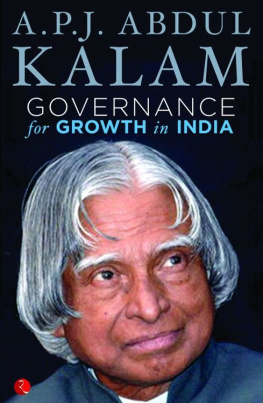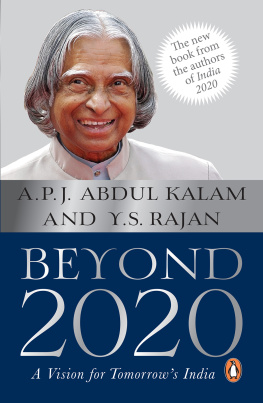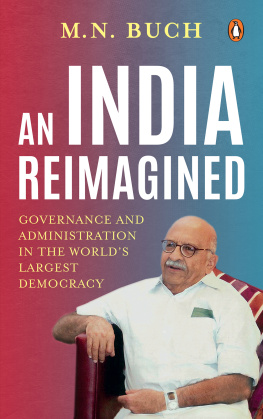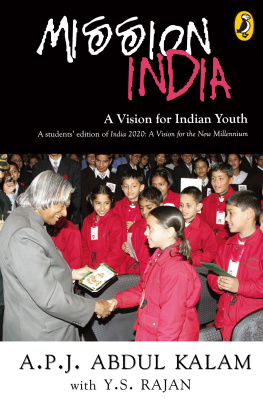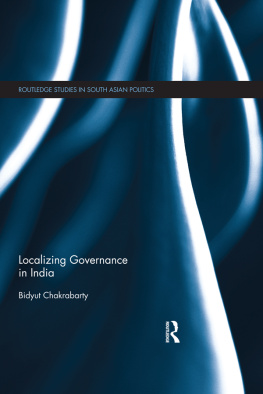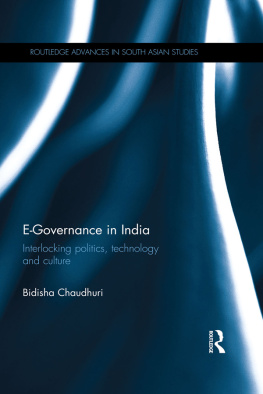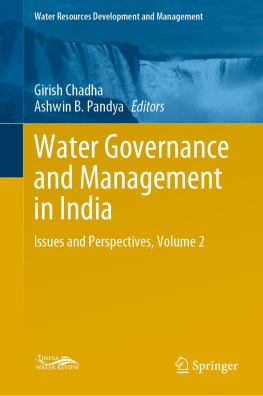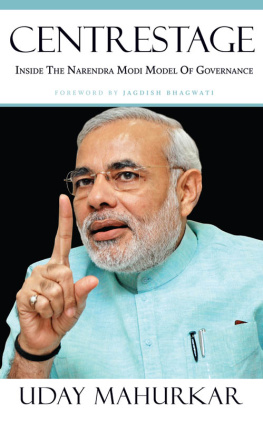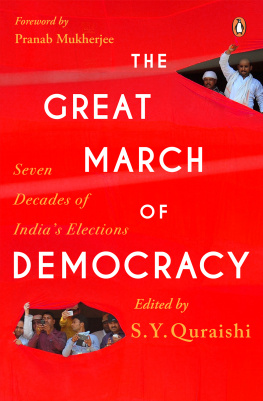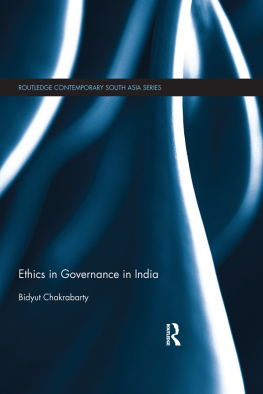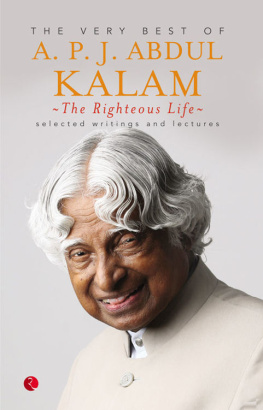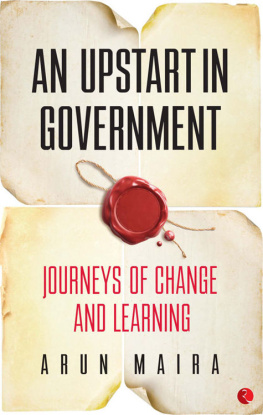GOVERNANCE
forGROWTH in INDIA
Born on 15 October 1931, at Rameswaram in Tamil Nadu, Dr Avul Pakir Jainulabdeen Abdul Kalam specialized in aeronautical engineering from Madras Institute of Technology. Dr Kalam is one of the most distinguished scientists of India and has received honorary doctorates from forty-five universities and institutions in India and abroad. He has been awarded the Padma Bhushan (1981), the Padma Vibhushan (1990) and Indias highest civilian award, the Bharat Ratna (1997). He has also received the King Charles II medal (2007), the Woodrow Wilson Award (2008), the Hoover Award (2008) and the International Von Krmn Wings Award (2009), among other international accolades.
Dr Kalam became the eleventh President of India on 25 July 2002. His focus and greatest ambition remains finding ways to transform India into a developed nation.
First published by
Rupa Publications India Pvt. Ltd 2014
7/16, Ansari Road, Daryaganj
New Delhi 110002
Sales Centres:
Allahabad Bengaluru Chennai
Hyderabad Jaipur Kathmandu
Kolkata Mumbai
Copyright A.P.J. Abdul Kalam 2014
All rights reserved.
No part of this publication may be reproduced, transmitted, or stored in a retrieval system, in any form or by any means, electronic, mechanical, photocopying, recording or otherwise, without the prior permission of the publisher.
While every effort has been made to obtain permissions, any omissions brought to our attention will be remedied in future editions.
First impression 2014
10 9 8 7 6 5 4 3 2 1
The moral right of the author has been asserted.
Printed by XXXXX
This book is sold subject to the condition that it shall not, by way of trade or otherwise, be lent, resold, hired out, or otherwise circulated, without the publishers prior consent, in any form of binding or cover other than that in which it is published.
Contents
Introduction
Vote for the Nation
I was at Ropar, Punjab, on 20 March 2014 to address and interact with some students. I met a large gathering of young boys and girls. While I was entering the venue, a group of studentstwo girls and four boyshailing from different states, approached me and said they had an important question and that I should answer it before I started my address and interaction.
The question that was put forth to me was: Sir, wherever we go, to any part of the country, be it on study tours or excursions or on leisure trips, we have interacted with the youth of that place. Many of them are of our age, eighteen years and above. When we discussed our voting rights with them, most of them said that they will not vote as they think nobody deserves to lead us as Members of Parliament or Members of the Legislative Assembly. We too feel the same way and have decided not to vote in the forthcoming elections. Sir, please tell us whether have taken the right decision?
I told them, Dear friends, I do not agree with you completely. In my eighty plus years of age, I have seen many parliamentary elections and assembly elections, and at each one I have voted for the right kind of person. At every election there are new candidates and sitting MPs and MLAs contest too. You have to choose the best candidate among them based on their work and contribution to society. Many a time the contribution is visible in the constituency from where they are contesting and there is also a record of their overall performance in the Parliament/Assembly. Information on their performance is also available through the media and the Internet. Based on the candidates credentials, you can discuss among yourselves and select the best performing, cleanest candidate, and vote for that person.
Remember, your right to vote is precious and to exercise your franchise is essential. You have a great opportunity to select the right person to represent you in the Parliament or in the Assembly. That means, you as a young citizen, are helping the nation to evolve a good government at the Centre or State. The nation will be grateful to you if you cast your vote and choose the right candidate.
This book has been written to examine the challenges we face as a democracy and to find some solutions so that we can all travel together on the road towards good governance, the end of corruption and building a truly empowered nation. I hope every youth and every citizen will be inspired to participate fully in the democratic process after reading this book and that it also answers some of the questions posed by my young friends at Ropar, Punjab.
Igniting the Faith of the Voter
Life has to be built on a great ideal.
Parliamentary Democracy
The tradition of democracy is not alien to India. Their importance in our history can be traced back to the ancient period when Sabhas and Samitis were two highly respected institutions in our village republics and performed functions similar to those of the popular representative bodies of today. Our choice of a democratic political system after achieving independence was, therefore, a continuation of an ethos that had always been there.
We are proud to be the worlds largest thriving parliamentary democracy. What amazes the world perhaps is the sagacity and maturity of the Indian voter who has always tried to exercise the mandate conscientiously and enthusiastically, proving time and again that the people are sovereign and the power flows from them.
Elections and the Youth of India
India is considered to be one of the youngest nations in the world in terms of its demographics. We have about 600 million youth and about 160 million of them are registered voters. In the future, the number of youth voters will only grow progressively. In this scenario, it is necessary to ensure that the youth are an integral and vibrant part of the democratic process. How do we motivate the youth to be partners in elections? How do we motivate the ones who dont vote normally due to various reasons?
The youth of India want to see elected members as their role models through their performance in the Parliament or State Assembly, and also in the way they lead their lives.
They definitely expect the elected representatives to ensure that the performance of the Parliament and State Assemblies are never disturbed or halted. For them, this action of non-performance is a crime. Above all, the youth of the nation want their representatives to follow the mission of developmental politics.
In this context, I would like to examine what changes we can bring about in the way we conduct our electoral process. We should also assess the expectations we have from the men and women we elect.
Constituency Manifesto
I would like to share with you my experience of interacting with the newly elected members of the legislative assembly of Karnataka in 2008 at the Indian Institute of Management, Bangalore. Before the interaction, I designed a questionnaire for the legislative members regarding their constituency development plans. This questionnaire was well publicized by the media, who said that I should not expect any substantial response from the members. However, to my pleasure and the medias surprise, I received more than a hundred responses, each well thought out and precisely planned and they reached me well before the interaction, despite a relatively short notice.
Next page
